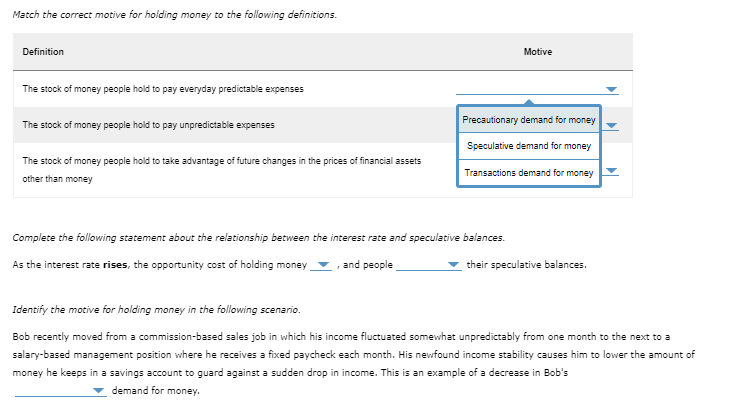Definition The stock of money people hold to pay everyday predictable expenses The stock of money people hold to pay unpredictable expenses The stock of money people hold to take advantage of future changes in the prices of financial assets other than money Motive Precautionary demand for money Speculative demand for money Transactions demand for money ▶ ▶
Definition The stock of money people hold to pay everyday predictable expenses The stock of money people hold to pay unpredictable expenses The stock of money people hold to take advantage of future changes in the prices of financial assets other than money Motive Precautionary demand for money Speculative demand for money Transactions demand for money ▶ ▶
Chapter16: Monetary Policy
Section: Chapter Questions
Problem 1SQP
Related questions
Question
Match the correct motive for holding money to the following definitions.
| Definition | Motive |
| The stock of money people hold to pay everyday predictable expenses | |
| The stock of money people hold to pay unpredictable expenses | |
| The stock of money people hold to take advantage of future changes in the prices of financial assets other than money |
Complete the following statement about the relationship between the interest rate and speculative balances.
As the interest rate rises, the opportunity cost of holding money , and people their speculative balances.
Identify the motive for holding money in the following scenario.
Bob recently moved from a commission-based sales job in which his income fluctuated somewhat unpredictably from one month to the next to a salary-based management position where he receives a fixed paycheck each month. His newfound income stability causes him to lower the amount of money he keeps in a savings account to guard against a sudden drop in income. This is an example of a decrease in Bob's demand for money.

Transcribed Image Text:Match the correct motive for holding money to the following definitions.
Definition
The stock of money people hold to pay everyday predictable expenses
The stock of money people hold to pay unpredictable expenses
The stock of money people hold to take advantage of future changes in the prices of financial assets
other than money
Motive
Precautionary demand for money
Speculative demand for money
Transactions demand for money
Complete the following statement about the relationship between the interest rate and speculative balances.
As the interest rate rises, the opportunity cost of holding money and people
their speculative balances.
▶
Identify the motive for holding money in the following scenario.
Bob recently moved from a commission-based sales job in which his income fluctuated somewhat unpredictably from one month to the next to a
salary-based management position where he receives a fixed paycheck each month. His newfound income stability causes him to lower the amount of
money he keeps in a savings account to guard against a sudden drop in income. This is an example of a decrease in Bob's
demand for money.
Expert Solution
Step 1
Since you have posted multiple questions, we will provide the solution to only the first question as per our Q&A guidelines. Please repost the remaining questions separately.
The demand for money refers to the nature of a person's desire to hold money instead of spending it. The theory of money demand, given by Keynes, states that people hold, or demand, money with three motives, transaction motive, precautionary motive, and speculative motive.
Trending now
This is a popular solution!
Step by step
Solved in 2 steps

Knowledge Booster
Learn more about
Need a deep-dive on the concept behind this application? Look no further. Learn more about this topic, economics and related others by exploring similar questions and additional content below.Recommended textbooks for you







Essentials of Economics (MindTap Course List)
Economics
ISBN:
9781337091992
Author:
N. Gregory Mankiw
Publisher:
Cengage Learning

Brief Principles of Macroeconomics (MindTap Cours…
Economics
ISBN:
9781337091985
Author:
N. Gregory Mankiw
Publisher:
Cengage Learning

Principles of Economics (MindTap Course List)
Economics
ISBN:
9781305585126
Author:
N. Gregory Mankiw
Publisher:
Cengage Learning